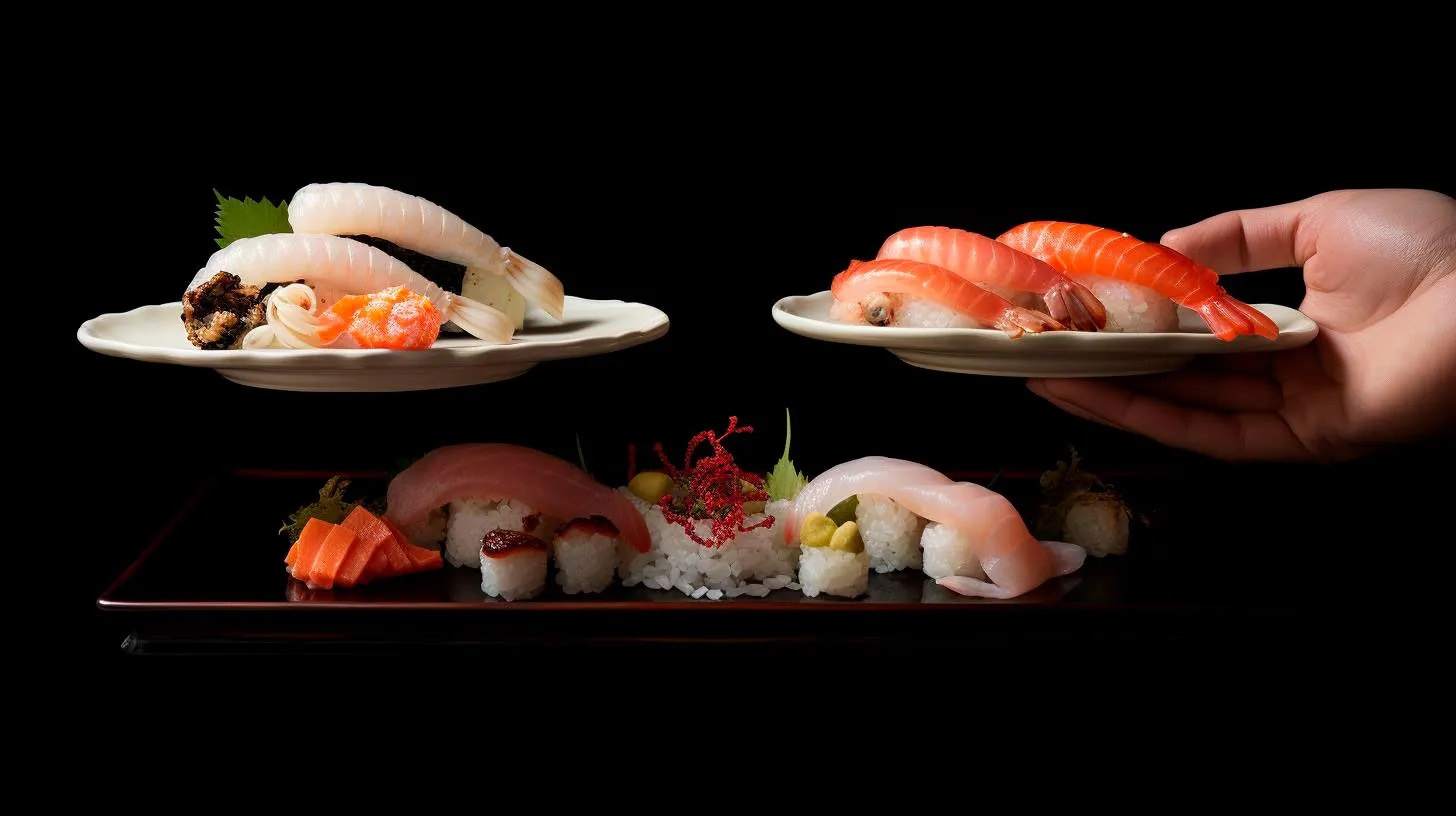Sushi: A Low-Calorie Option Bursting with Omega-3 Fatty Acids
In this article, we will explore why sushi is a smart choice for both your taste buds and your well-being.
The Health Benefits of Sushi
Sushi is made primarily from raw fish, seaweed, and rice. This combination offers numerous advantages for your health:
- Low in Calories: Sushi is a low-calorie food, making it an excellent option for those trying to lose or maintain weight. With an average of just 40-60 calories per piece, it is a healthier alternative to many other fast food options.
- Rich in Omega-3 Fatty Acids: Fish, a key ingredient in sushi, is an excellent source of Omega-3 fatty acids. These essential fats promote heart health, reduce inflammation, boost brain function, and support the overall well-being of your body.
- High in Protein: Sushi is rich in high-quality protein, which is essential for muscle growth, tissue repair, and overall body function. Protein also helps control hunger levels, making you feel fuller for longer.
- Full of Essential Nutrients: Sushi is a great source of vitamins and minerals, such as vitamin A, vitamin D, iodine, potassium, and magnesium. These nutrients contribute to various bodily functions and support overall health.
- Low in Saturated Fat: Saturated fats can increase the risk of heart disease. Sushi, particularly when choosing lean fish options, can help reduce saturated fat intake in your diet and promote heart health.
Choosing Healthy Sushi Options
While sushi offers an array of health benefits, it is essential to make informed choices to optimize its nutritional value. Here are some tips to consider:
- Opt for Fresh and High-Quality Fish: Ensure the sushi restaurant sources its fish from reputable suppliers to guarantee freshness and minimize the risk of contamination.
- Select Lean Protein: Choose sushi rolls with lean seafood options like tuna, salmon, or shrimp, as they are lower in calories and saturated fats.
- Choose Brown Rice Rolls: Brown rice, a healthier alternative to white rice, provides additional fiber and nutrients. Many sushi restaurants now offer rolls made with brown rice.
- Experiment with Vegetable Rolls: Vegetarian sushi options like avocado, cucumber, or sweet potato rolls are also delicious and nutritious alternatives.
- Limit Soy Sauce and Tempura: While soy sauce and tempura add flavor, they can also increase sodium and calorie intake. Use them sparingly to enjoy the true taste of sushi.
The Growing Popularity of Sushi
Sushi has gained enormous popularity worldwide. Let’s take a look at some interesting statistics:
- In the United States, sushi consumption has doubled in the last decade, with more than 4,000 sushi restaurants nationwide.
- In 2019, the global sushi market was valued at $14.84 billion and is projected to reach $19.89 billion by 2027, growing at a CAGR of 3.6%.
- In Japan, there are over 45,000 sushi restaurants, catering to both locals and tourists.
- Salmon is one of the most popular fish used in sushi, accounting for over 80% of sushi-grade fish consumption in the United States.
- California roll, a type of sushi roll with avocado, crab, and cucumber, was invented in Los Angeles in the 1960s and has become one of the most popular sushi rolls worldwide.
The Takeaway
Sushi is not only a culinary delight but also a healthy option packed with essential nutrients and Omega-3 fatty acids. With its low-calorie nature, high protein content, and various health benefits, sushi is a smart choice for those seeking a balanced diet. By making informed choices and selecting fresh ingredients, you can elevate your sushi experience while nurturing your well-being.
So, why not indulge in a delicious sushi feast and reap the nutritional rewards it offers?
Delicious Sushi Rolls Packed with Essential Vitamins and Minerals
The Nutritional Benefits of Sushi
When it comes to the nutritional value of sushi, it largely depends on the ingredients used to make it. However, most sushi rolls share some common nutritional benefits:
- Rich in Omega-3 Fatty Acids: Many types of fish used in sushi, such as salmon and tuna, are excellent sources of omega-3 fatty acids. These healthy fats have been proven to reduce the risk of heart disease, lower blood pressure, and improve brain function.
- High in Protein: Sushi rolls are typically made with fish and seafood, which are abundant sources of protein. Protein is essential for building and repairing tissues in the body, supporting muscle health, and boosting the immune system.
- Packed with Essential Vitamins and Minerals: Sushi rolls often contain a variety of vegetables, such as avocados, cucumbers, and carrots, which are loaded with essential vitamins and minerals. These include vitamin A, C, E, K, as well as folate, potassium, and magnesium.
- Low in Calories: Sushi rolls are generally low in calories compared to other popular fast food options. This makes them a great choice for those looking to maintain or lose weight while still enjoying a satisfying meal. Just be mindful of the portion sizes and the types of sauces and condiments added.
Sushi Rolls for Specific Nutritional Needs
What makes sushi particularly versatile is the wide array of fillings and toppings available, allowing you to customize your rolls based on your specific nutritional needs:
Vegetarian and Vegan Options
If you follow a vegetarian or vegan diet, sushi can still be a great choice for you. Opt for veggie rolls that are filled with ingredients like cucumber, avocado, tofu, and pickled vegetables. These rolls provide an abundance of vitamins, minerals, and plant-based protein.
Gluten-free Sushi Rolls
Individuals with gluten sensitivities or celiac disease can still enjoy sushi by choosing rolls made with gluten-free options. Instead of traditional soy sauce, you can use tamari or gluten-free soy sauce as a dipping sauce.
Low-Carb Sushi Rolls
For those watching their carbohydrate intake, there are sushi rolls that use cauliflower rice instead of traditional sushi rice. This modification reduces the overall carb content while still delivering the nutritional benefits of sushi.
Enjoying Sushi Responsibly
While sushi rolls offer numerous health benefits, it is important to enjoy them responsibly. Here are some key takeaways to keep in mind:
- Choose a reputable sushi restaurant that maintains high hygiene standards and sources their ingredients from reliable suppliers.
- Limit your intake of sushi rolls that contain high amounts of mayonnaise, cream cheese, or tempura, as these can increase the calorie and fat content.
- Be cautious of your mercury intake, especially if you consume sushi rolls containing high-mercury fish like tuna. Opt for sushi rolls with lower mercury options such as salmon or shrimp if you are concerned.
- Balance your sushi meal with other nutritious foods like seaweed salad, miso soup, or edamame to ensure a well-rounded meal.
In conclusion, sushi rolls are not only a delectable culinary experience, but they also offer a wide range of essential vitamins and minerals. From omega-3 fatty acids to protein and various vitamins, sushi can be a valuable addition to a balanced and healthy diet. By making mindful choices and exploring different sushi options, you can enjoy this delicious Japanese delicacy while reaping its nutritional benefits.
The Art of Sushi: A Nutritional and Flavorful Delight
The Health Benefits of Sushi
One of the key reasons sushi has gained immense popularity is its inherent health benefits. Here are some of the advantages of incorporating sushi into your diet:
- High-quality protein: Sushi is primarily made from raw fish, which is an excellent source of high-quality protein. Protein helps build and repair tissues in our body and plays a crucial role in maintaining muscle mass.
- Rich in omega-3 fatty acids: Many types of fish used in sushi, such as salmon and tuna, are packed with omega-3 fatty acids. These essential fats are known to reduce the risk of heart disease, improve brain function, and promote healthy skin.
- Low in calories: Sushi rolls, especially those with lean fish, are relatively low in calories compared to other popular fast food options. This makes sushi a great choice for those looking to maintain a healthy weight.
- Abundance of nutrients: Sushi often includes vegetables like avocado, cucumber, or seaweed, which are rich in vitamins, minerals, and dietary fiber. These nutrients contribute to overall good health and well-being.
Sushi is not only nutritionally beneficial but also incredibly versatile. It offers a wide range of options suitable for various dietary preferences and restrictions. Whether you’re a vegetarian, pescatarian, or simply looking for gluten-free alternatives, there’s a sushi roll to satisfy your cravings.
Exploring the Delightful Flavors
The exquisite flavors of sushi are a result of the meticulous preparation and combination of ingredients. Each bite is a burst of freshness and harmony. Here are some key flavor profiles you can expect when enjoying sushi:
1. Umami:
Sushi is known for its umami flavor, the fifth taste sensation, which gives it a savory and rich flavor profile. The combination of fish, soy sauce, and wasabi creates an explosion of umami on your palate.
2. Creaminess:
Avocado, a popular ingredient in many sushi rolls, adds a creamy texture that complements the other flavors. It enhances the overall mouthfeel and brings a delightful creaminess to each bite.
3. Delicate sweetness:
Sushi rice, seasoned with vinegar and sugar, adds a touch of delicate sweetness to balance the savory flavors of the fish. This subtle sweetness enhances the overall flavor experience.
4. Freshness:
The freshness of the ingredients used in sushi is unparalleled. The raw fish, crispy vegetables, and vibrant seaweed contribute to the overall freshness and crispness of each bite.
The combination of these distinct flavors creates a symphony for your taste buds, making sushi a truly gastronomic delight.
The Key Takeaways
As you dive into the world of sushi, here are the key takeaways to remember:
- Sushi is a nutritious choice, providing high-quality protein and omega-3 fatty acids.
- It is a low-calorie option compared to many other fast food choices.
- The ingredients in sushi offer an abundance of vitamins, minerals, and dietary fiber.
- Sushi is versatile, catering to different dietary preferences.
- Flavor profiles in sushi include umami, creaminess, delicate sweetness, and incredible freshness.
With sushi, you not only indulge in a visually appealing and delicious dish, but also reap the health benefits it has to offer. So, step out of your culinary comfort zone and embark on a journey of flavors with the art of sushi.
Unveiling the Secrets: How Sushi Boosts Your Immune System
So, roll up your sleeves and dive into the fascinating world of sushi.
The Power of Omega-3 Fatty Acids
One of the key reasons sushi is beneficial for your immune system lies in its high content of omega-3 fatty acids. Fish such as salmon, tuna, and mackerel, commonly used in sushi, are abundant in these essential fatty acids. Omega-3s are known to reduce inflammation in the body, strengthen the immune system, and improve overall cardiovascular health.
- Rich source of omega-3 fatty acids
- Reduces inflammation and strengthens the immune system
- Improves cardiovascular health
Research has shown that omega-3 fatty acids support the proper functioning of immune cells, helping them respond effectively to infections and diseases. By including sushi in your diet, you can increase your intake of these crucial nutrients that promote a healthy immune system.
Antioxidant-Rich Ingredients
Sushi is also packed with antioxidant-rich ingredients that can give your immune system an extra boost. Ingredients like seaweed, ginger, and wasabi provide a plethora of antioxidants, vitamins, and minerals.
- Seaweed is an excellent source of vitamins A, C, and E
- Ginger possesses powerful antioxidant and anti-inflammatory properties
- Wasabi is rich in vitamin C and can stimulate the immune system
Antioxidants play a crucial role in defending the body against free radicals, which are harmful compounds that can cause cellular damage. By consuming sushi, you can benefit from these antioxidant-rich ingredients, strengthening your immune system and protecting your cells from damage.
Fermented Delights: A Boost for Your Gut
Sushi often includes fermented ingredients like pickled ginger and soy sauce, which provide additional benefits for your immune system. Fermented foods contain probiotics, which are beneficial bacteria that support a healthy gut.
- Probiotics help maintain a strong immune system
- Improves digestion and nutrient absorption
- Enhances gut health and reduces the risk of infections
A strong immune system heavily relies on a healthy gut. Studies have shown that a well-balanced gut microbiome can enhance immune response and protect against various diseases. By regularly consuming sushi, you can introduce beneficial bacteria into your gut, thus improving your overall immune function.
Top Takeaways
Sushi offers a multitude of benefits for your immune system:
- The high omega-3 fatty acid content reduces inflammation and strengthens the immune system.
- Antioxidant-rich ingredients protect against cellular damage and boost immune function.
- Fermented ingredients introduce probiotics, maintaining a healthy gut and enhancing the immune response.
Now that you are aware of the immune-boosting potential of sushi, indulge in this delectable cuisine while nourishing your body. Remember to choose high-quality sushi made with fresh ingredients for optimal health benefits. Say yes to sushi and unlock the secret to a stronger immune system!
Sources:
1. Hirota, S. (2015). The role of omega-3 fatty acids in maintaining a healthy immune system: A review. Journal of Clinical and Scientific Research, 4(3), 155-165.
2. Mayo Clinic – Probiotics: In Depth.



